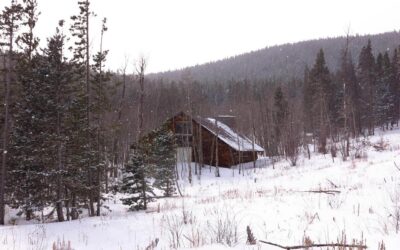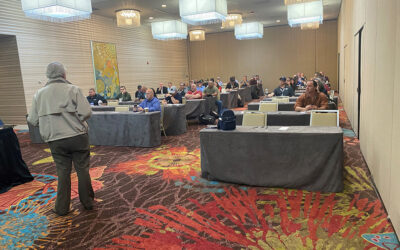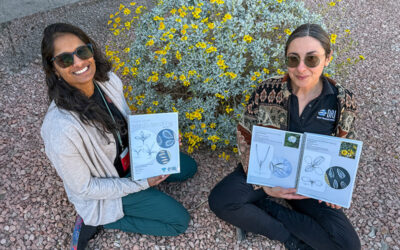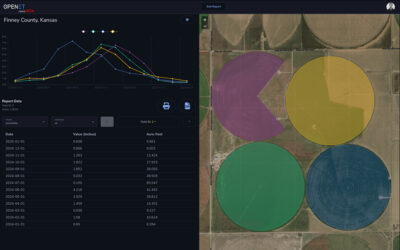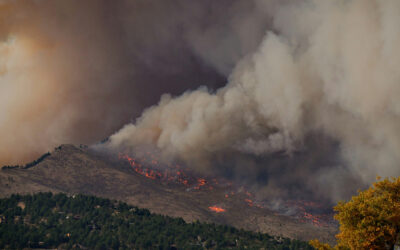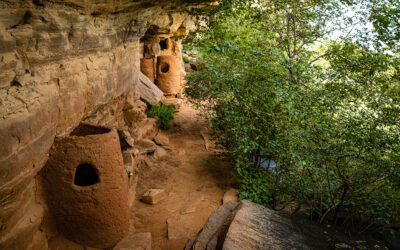An examination of Rocky Mountain snow finds higher contamination levels of mercury and others metals in the northern part of the range, consistent with increased current and historical mining in the region. The study, published in the May issue of the journal Environmental Pollution, examined contamination levels for Mercury, Zinc, Cadmium and Antimony from nearly 50 sites in the Rocky Mountains.
Posts by Elyse DeFranco
Blurring the Line Between Rain and Snow: The Limits of Meteorological Classification
A new study published in Nature Communications utilizes insights gleaned from DRI’s Mountain Rain or Snow project to evaluate why traditional weather forecasting struggles to identify the rain/snow transition line. The research was possible because thousands of community members across the U.S. contributed more than 40 thousand observations of the type of precipitation falling at their location.
DRI Scientists Work to Protect Miner Health and Safety Across Nevada
To help protect miners and assist mine managers in reducing hazardous exposures, DRI scientists Xiaoliang Wang, Judy Chow, and John Watson are conducting free trainings to raise awareness about health risks and effective protection methods. Data from the Mine Safety and Health Administration (MSHA) show that as much as 27% of miners are overexposed to air contaminants.
Tiffany Pereira Blends Art and Science in New Mojave Seedling Guide
The ecologist and illustrator created a first-of-its-kind seedling guide to help land managers and community members identify native plant seeds and aid with restoration work. DRI sat down with Pereira for more information about her goals and inspiration for the project, the benefits of fusing art with science, and the miracles contained in the tiniest seeds.
Kristin VanderMolen Receives 2025 Rising Researcher Award from the NSHE Board of Regents
DRI scientist Kristin VanderMolen, Ph.D., has been awarded the 2025 Rising Researcher Award in recognition of her outstanding early-career accomplishments and potential for advancing scientific knowledge in the field of applied anthropology.
FARMing with Data: OpenET Launches New Tool for Farmers and Ranchers
A NASA, DRI, and U.S. Geological Survey (USGS)-supported research and development team is making it easier for farmers and ranchers to manage their water resources. The team, called OpenET, created the Farm and Ranch Management Support (FARMS) tool, which puts timely, high-resolution water data directly in the hands of individuals and small farm operators.
DRI Invites Nevada Families to Science and Literacy Events for Pre-K Students
DRI’s STEM Education Program is holding free events focused on developing literacy through engaging science activities for Pre-K children 5 and younger throughout Nevada. Through hands-on experiments, story time, and interactive games, the events will bring ecology and electricity to life for the whole family. Each child will also receive free books to take home (while supplies last).
Meet Alexa Daniel
Alexa Daniel, M.Sc., is a hydrogeologist and Assistant Research Scientist who joined DRI this past December. Based at Reno’s campus, she will be spending most of her time over the next two years developing water resource plans for Nevada’s rural counties. In the following interview, Daniel shares her wide range of experience studying water resources in the West, her favorite book, and an invitation to a network event she’s spearheading for young professionals.
Weather Whiplash is Amplifying Wildfire Risk
While fires engulfed large swaths of southern California in early January, destroying more than 16,000 structures, taking at least 29 lives, and choking the air with smoke, a new study about weather whiplash was released. Co-authored by DRI’s Christine Albano, the research examined how a warming climate is creating an atmosphere more prone to extreme weather. Now, Albano and her co-authors have released a new report that applies the knowledge gained from January’s study to the recent fires, analyzing the broader climatic context that contributed to the unprecedented infernos.
New Study Traces Indigenous Population Shifts in North America Before Europeans
DRI’s Erick Robinson, Associate Research Professor of Climate and Archaeology, co-authored a new study that provides insight into North America’s Indigenous communities prior to European contact. The research found that although Indigenous populations varied regionally, the continent saw a population peak around 1150 A.D. before experiencing declines, likely stemming from drought, disease, emigration and warfare. A brief recovery around 1500 A.D. was followed by a sharp decrease upon the arrival of Europeans.

